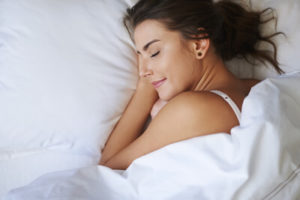
In my first day of practice, a woman visited my office because she’d been five years without a full nights sleep.
As you could imagine she was physically depleted.
It was affecting her life at work and relationship with her husband until it got got so bad that she decided to stop pretending like everything was ok. So she applied for an assessment with me.
She’s not alone, up to half of all Australians experience symptoms of insomnia.
What is Insomnia?
Insomnia is a difficulty falling or staying asleep.
It not a disorder itself, but is a symptom of a number of sleep disorders.
One cause of Insomnia is poor sleep hygiene such as having a room that’s too hot or cold or drinking coffee, watching TV before bed or irregular sleep cycles.
Western Medical View
According to western medicine there are links between mental disorders and insomnia. Up to 80% of people with major depression report symptoms of poor sleep.
When a stressful event affects sleep, this is called adjustment insomnia.
Arthritis, cancer, back pain and other medical disorders can also lead to poor sleep.
So too do the use and withdrawal of drugs such as opioids and contraceptives.
Other causes include:
- Central sleep apnea
- Circadian rhythm disorder
- Obstructive sleep apnea
- Restless leg syndrome
Treatment
Often all that’s needed for mild insomnia is good sleep hygiene.
For severe insomnia, hypnotics are used but may have side effects such as hallucinations and impaired coordination.
Antidepressants that cause sedation are used for people with depression but side effects include weight gain. Cognitive behavioural therapy is also an option.
Chinese Medical (CM) View
Insomnia (Bu Mei) is defined as the inability to sleep normally.
Firstly, mild cases include difficulty falling asleep, waking easily or difficulty sleeping after waking. Secondly, severe cases are an inability to sleep at all.
There are a number of triggers of insomnia, however the most common and the most important cause of insomnia is an insufficiency of blood flow through the heart.
5 Known Triggers In Chinese Medicine
- Working long hours without rest, combined with a poor diet weakens the constitution and leads to insomnia.
- A large loss of blood during childbirth can lead to blood insufficiency resulting in light sleep and excessive dreaming.
- Prolonged anger and unresolved resentment affects the “Liver” and causes dream disturbed sleep.
- Over-indulging in sweet and salty food causes food retention, making sleep difficult.
- During infection, a person may feel recovered but ‘Residual heat’ lingers. This lodges in the diaphragm, affects the heart and impairs sleep.
How Can Chinese Medicine treat Insomnia?
Each patient is assessed and provided a specific course of treatment to resolve triggers and treat the underlying cause.
The most common and the most clinically effective strategy is improving blood circulation through the heart using Chinese herbal medicine.
9 Steps To Support Sleep
- Firstly, set up the sleep environment. A temperature of 25 degrees or more increases waking. Keep room temperature between 18 and 24 degrees.
- Secondly, light can penetrate the eyelids and stimulate the retina, causing waking. A dark room is ideal
- Thirdly, exercise each morning in sunlight can rebalance our biological clock and support sleep.
- Eat until 70% full and avoid overeating. This gives us energy during the day and sets up a restful sleep at night.
- Soaking feet in warm water before bed improves circulation and decreases tension before bed.
- Refined sugar, alcohol and coffee are stimulants that affect our ability to sleep deeply.
- Lying on the right side with legs bent is considered a good position. The heart is high allowing blood to circulate freely. The liver is low, allowing blood to collect and promote sleep.
- Finally, apply for an assessment here.
David L. Edwards is an author, Chinese medicine physician and acupuncturist. He is the author of The Body Fat Formula and The Pocketbook guide to Chinese medicine and painless cures. He is the creator of Barefoot Health and Wellness health programs.
Apply for an assessment here
If you got value from this article, share it with your friends on social media by clicking the share button below.
References:
- Porter, Kaplan (editors). The Merck Manual of Diagnosis and Therapy, 19th ed. Merck Sharp & Dohme Corp., Whitehouse Station, N.J. pg. 1703 -1715
- The Practice of Chinese medicine, second edition. Giovanni Maciocia. Churchill Livingstone Elsevier. Pg. 407- 433.
- The Tao of Healthy eating (Dietary wisdom according to Chinese medicine (Second edition). Bob Flaws






Hey very nice blog!